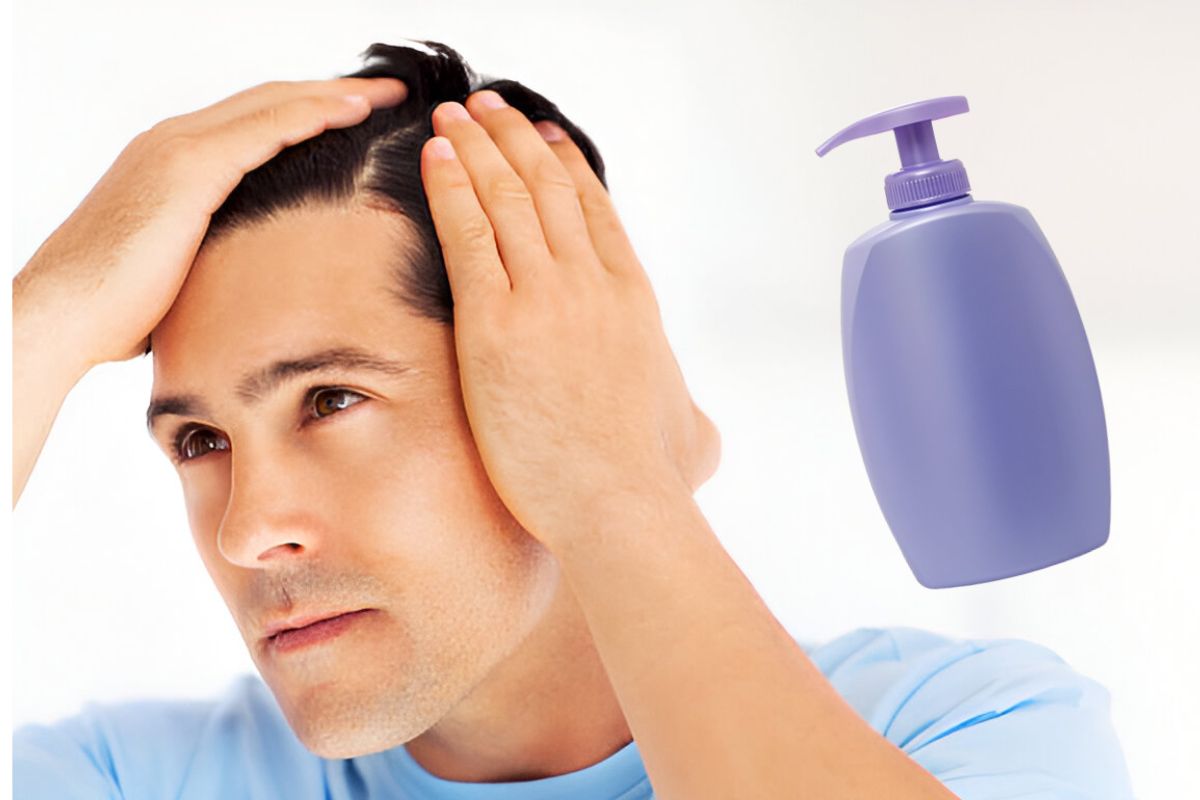Hair loss and receding hairlines are common challenges for men, often leading to a search for solutions that are both effective and affordable.
Among the various options available, medicated shampoos are frequently marketed as a promising remedy for hairline restoration.
But do they really work? Let’s explore the science, benefits, and limitations of medicated shampoos in addressing hair loss and restoring male hairlines.
Table of Contents
Understanding Hair Loss and Receding Hairlines
Hair loss in men, often referred to as male pattern baldness or androgenetic alopecia, is influenced by genetics, hormonal changes, and age.
The condition typically starts with a receding hairline and can progress to thinning or complete baldness on the crown of the head. Other factors such as stress, poor nutrition, and certain medical conditions may also contribute to hair loss.
Medicated shampoos claim to combat these issues by targeting the underlying causes of hair loss. But how do they work, and are they a viable solution for those struggling with a receding hairline?
The Science Behind Medicated Shampoos
Medicated shampoos are formulated with active ingredients that address specific hair and scalp conditions.
The most common active ingredients include:
1. Ketoconazole
Ketoconazole is an antifungal agent that reduces dandruff and inflammation. Research suggests it may also block dihydrotestosterone (DHT), a hormone linked to hair loss, making it a popular ingredient in shampoos aimed at combating androgenetic alopecia.
2. Minoxidil
While not typically found in shampoos, Minoxidil is a well-known topical treatment for hair regrowth. Some medicated shampoos include derivatives of Minoxidil to stimulate hair follicles and improve scalp health.
3. Salicylic Acid
Salicylic acid exfoliates the scalp, removing dead skin cells and buildup that can block hair follicles. A clean and healthy scalp is crucial for encouraging hair growth.
4. Biotin and Caffeine
Biotin (Vitamin B7) supports keratin production, a protein essential for healthy hair. Caffeine, on the other hand, is believed to stimulate hair follicles and prolong the growth phase of hair.
Benefits of Medicated Shampoos for Hairline Restoration
While medicated shampoos may not be a miracle cure, they offer several benefits that contribute to overall hair and scalp health, potentially aiding in the restoration of a receding hairline:
Improved Scalp Health
Medicated shampoos often address issues such as dandruff, seborrheic dermatitis, and inflammation. A healthy scalp creates an optimal environment for hair growth.
Reduction in Hair Loss
Ingredients like Ketoconazole and caffeine may help slow down hair loss by targeting DHT and improving blood circulation to the hair follicles.
Strengthened Hair
By nourishing the hair with vitamins and proteins, these shampoos can strengthen existing hair strands, reducing breakage and improving overall hair density.
Limitations of Medicated Shampoos
While the benefits are notable, it’s important to understand the limitations of medicated shampoos in restoring male hairlines:
1. Not a Standalone Solution
Medicated shampoos are most effective when used as part of a comprehensive hair care regimen. They may improve scalp conditions and reduce hair loss, but significant regrowth often requires additional treatments like oral medications or hair transplants.
2. Time and Consistency
Results from medicated shampoos can take months to become noticeable. Consistent use is key, and even then, the outcomes may vary depending on the individual’s genetic predisposition and severity of hair loss.
3. Potential Side Effects
Some ingredients in medicated shampoos, such as Ketoconazole, may cause irritation or dryness in sensitive individuals. Always perform a patch test and consult with a dermatologist before starting a new treatment.
Tips for Choosing the Right Medicated Shampoo
With so many products on the market, selecting the right medicated shampoo can be overwhelming.
Here are some tips to guide your decision:
- Identify Your Needs Determine whether your primary concern is dandruff, inflammation, or DHT-related hair loss. Choose a shampoo with ingredients that address these specific issues to help with the male aesthetic.
- Look for Proven Ingredients Seek shampoos with clinically supported ingredients like Ketoconazole, caffeine, and Biotin. Avoid products with unverified claims.
- Read Reviews and Seek Professional Advice Check customer reviews for real-world insights, but don’t hesitate to consult a dermatologist for recommendations tailored to your condition.
Complementing Shampoos with Lifestyle Changes
To maximize the benefits of medicated shampoos, consider adopting healthy lifestyle habits that support hair growth:
- Balanced Diet: Ensure your diet is rich in vitamins, minerals, and proteins essential for healthy hair.
- Stress Management: Chronic stress can exacerbate hair loss, so incorporate relaxation techniques like yoga or meditation into your routine.
- Regular Exercise: Physical activity improves blood circulation, delivering nutrients to the hair follicles.
- Proper Hair Care: Avoid harsh chemical treatments and excessive heat styling, which can weaken hair and contribute to breakage.
The Verdict: Can Medicated Shampoos Restore Hairlines?
Medicated shampoos can play a supportive role in hairline restoration by improving scalp health, reducing hair loss, and strengthening existing hair.
However, they are not a standalone cure for receding hairlines, particularly in advanced stages of male pattern baldness.
For significant results, a combination of treatments, including professional medical advice, may be necessary.
While medicated shampoos offer hope and convenience, realistic expectations and a holistic approach are key to achieving the best possible outcomes.
Start your journey by selecting a shampoo tailored to your needs and commit to a consistent hair care routine.

